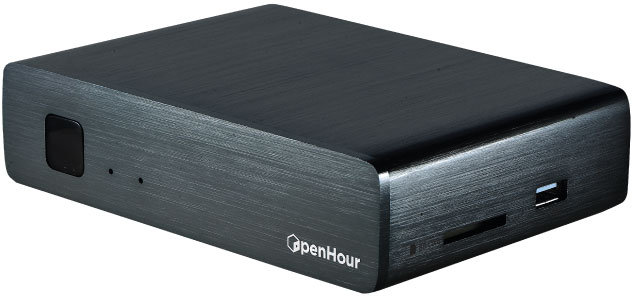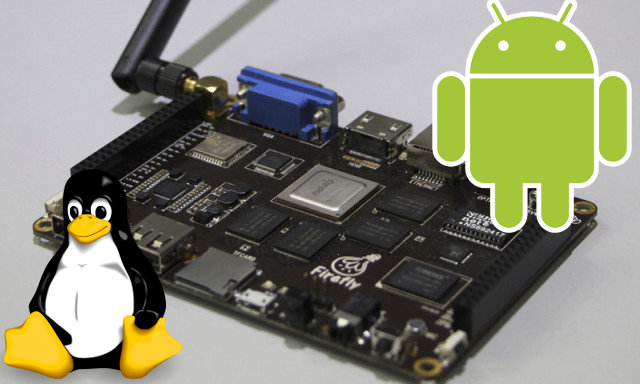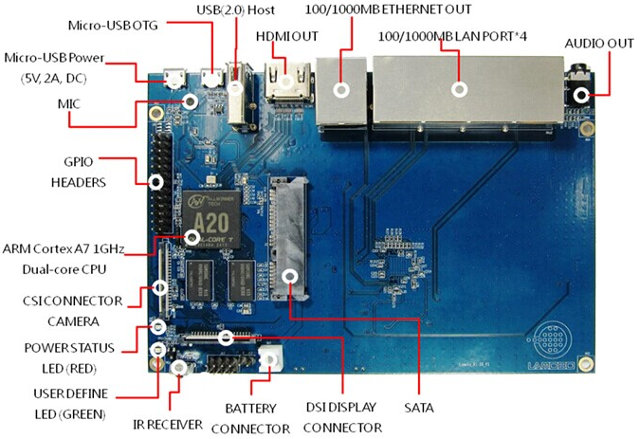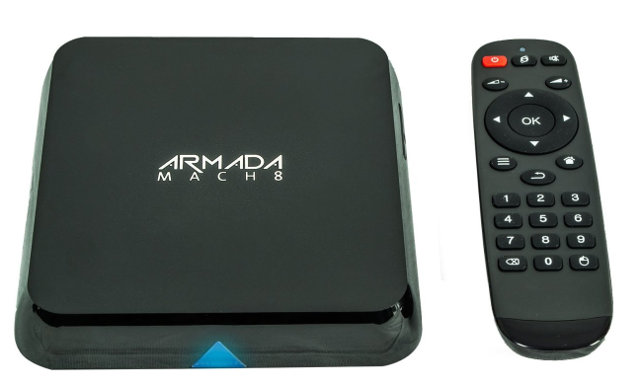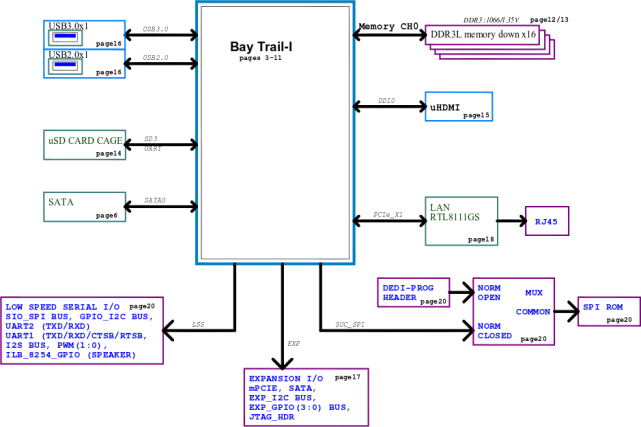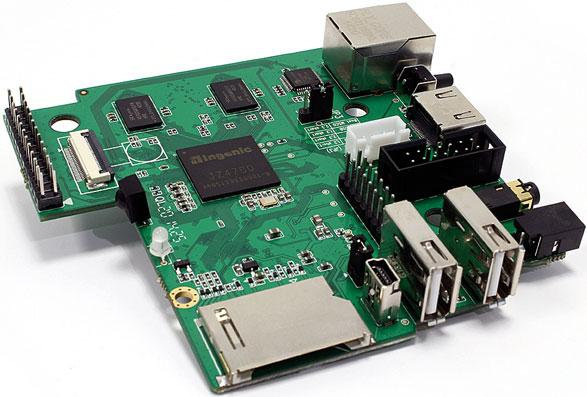Cloud Media, previously known as Syabas, has been selling Popcorn Hour media players based on Linux for several years, but with OpenHour Chameleon the company is about to launch their first Android media player powered by Rockchip RK3288. The device is similar to other RK3288 TV boxes, except it does not come with internal storage at all, and instead boots Android 4.4.2 from a provided 8GB SD card, with later plans to have support for Linux operating systems such as Ubuntu. Another particularity is that they’ll use an aluminum casing for better heat dissipation of the Rockchip RK3288 processor which can get pretty hot… OpenHour Chameleon specifications: SoC – Rockchip RK3288 quad core ARM Cortex A12 / A17 processor with ARM Mali-T764 quad-core 3D GPU supporting OpenGL ES 1.1/2.0/3.0, and OpenCL 1.1 System Memory – 2GB DDR3 Storage – No Internal storage + SD card slot with 8GB card (including […]
Rockchip RK3288 Android 4.4.2 SDK and Schematics Released for Firefly Board
Firefly-RK3288 development board was first announced in July. I still don’t have news about availability nor pricing, but the T-Firefly website launched yesterday. They seem do have a nice Wiki, but unfortunately everything is currently in Chinese, except when you go to the download page. You’ll find firmware upgrade_tool for Linux and Windows, the USB drivers for rooting and firmware update, firmware images (Android 4.4.2, Ubuntu 14.04, and dual boot), the board schematics (PDF), and Android KitKat 4.4.2 SDK with U-Boot, Linux, and Android source code, some documentation, XBMC apk (no source) with H.265 hardware decode support for MP4, MOV and MKV container formats. The SDK is available on Bitbucket. I planned to test it, but unfortunately my network connection is very slow (and unstable) to this server, and I failed to retrieve it with git clone. The company also posted the build instructions in Chinese in their website, but […]
Linaro 14.08 Release with Kernel 3.16 and Android 4.4.4
I’m a little late for that one, as Linaro 14.08 was released last Thursday. Nevertheless, this release features Linux kernel 3.16 (baseline), Linux 3.10.52 (LSK), and Android 4.4.4. As usual Linaro has worked on member hardware such as Qualcomm based IFC6410 and ARM Juno &Vexpress boards. They’ve also committed changes for LLVM, big Endian, and added a workload generator tool (rt-app) to the Ubuntu and Android image. This tool has been developed and used by the power management working group, presumably to measure and optimize power consumption under various loads. Here are the highlights of this release: Linux Linaro 3.16-2014.08 GATOR version 5.19 (new version) updated topic from Qualcomm LT (ifc6410 board support) updated Versatile Express ARM64 support (FVP Base and Foundation models, Juno) from ARM LT (Landing Team) updated Versatile Express patches from ARM LT updated LLVM topic (follows the community llvmlinux-latest branch) Big endian support (the 2014.05 topic […]
New Optimized Web Browser Released for the Raspberry Pi
If you’ve ever tried to use a Raspberry Pi to browse the web, you must have noticed how frustrating it can be due to the overall sluggishness of the system. But thanks to work by Collaborra, which optimized Epiphany Web browser for the Raspberry Pi, bringing features such as 720p HTML5 hardware video decoding (no flash support), faster loading and scrolling, etc.., the web browsing experience has much improved, although as you’ll see from the video below, it’s still not quite 100% perfect. The key modifications brought to Epiphany Web browser are listed below: More responsive UI and scrolling, even while loading a page Progressive tiled rendering for smoother scrolling Startup is three times faster Avoid useless image format conversions Better YouTube support, including on-demand load of embedded YouTube videos to make page load much faster Hardware decoding and scaling of videos (through gst-omx) Reduction of the number of memory […]
Banana Pi BPI-R1 Board Based on AllWinner A20 Features 5 Ethernet Ports, a SATA Interface, and More
SinoVoIP, a company known for its Banana Pi board and related spamming, has been working on another AllWinner A20 product called BPI-R1 (Banana Pi R1), a router/NAS platform that features 5 Gigabit Ethernet ports, a SATA interface, HDMI, audio output, and more. BPI-R1 Board specifications: SoC- Allwinner A20 dual core Cortex A7 processor @ 1 GHz with Mali-400MP2 GPU System Memory – 1 GB DDR3 Storage – SD card slot up to 64GB, SATA connector for hard drive or SSD up to 2TB Video output – HDMI, LVDS/RGB via DSI connectors Audio I/O – HDMI, 3.5mm stereo jack, and on-board microphone Camera – CSI connector possibly interfacing with their upcoming BPI-D1 camera Connectivity – 5x Gigabit Ethernet (RJ45) ports including 4x LAN ports, 1x WAN port, 802.11 b/g/n Wi-Fi (RTL8192CU module) with two antenna connectors. USB – 1x USB 2.0 port, 1x micro USB OTG port, 1x micro USB for […]
Armada Mach 8 Pure Linux is a Quad Core XBMC Linux TV Box
Armada Mach 8 is an Amlogic S802 based TV Box apparently based on M8/EM8 hardware, but instead of running Android, it comes with XBMC Linux. It’s unlikely a quad core media player brings much performance over a dual core media player with XBMC Linux, but Amlogic S802 adds 4K video playback compared to Amlogic AML8726-MX. One of the main advantages of Linux compared to Android is support for automatic frame rate switching depending on the video you are watching (24Hz, 50Hz, 60Hz…), in order to avoid regular skipped frames when the video frame rate does not match the video output refresh rate. Let’s double check the specifications to confirm they are indeed the same as Shenzhen Tomato / Enybox M8, except possibly for Bluetooth: SoC – AMLogic S802 quad core Cortex A9r4 processor @ 2GHz with Mali‐450MP6 GPU @ 600Mhz System Memory – 2GB DDR3 Storage – 8GB NAND flash […]
MinnowBoard MAX Schematics, Board layout, Gerber, and BoM Released
MinnowBoard MAX (aka MinnowBoard2) is an embedded board powered by Intel Atom Bay-Trail-I E3815 (single core) or E3825 (dual core) processor, with 1 to 2GB RAM, SATA II, USB 3.0, Gigabit Ethernet ports, and more. The board currently officially supports four operating systems: Debian GNU/Linux, Linux built with the Yocto Project, Android 4.4, and Windows 8.1. One of its main selling point is the price as the single core version sells for $99, and the dual core version for $129, rivalling in price with equivalent ARM based development boards. It’s also an open source hardware board, and as it’s now about to ship, CircuitCo released all hardware files under a Creative Commons CC-BY-SA license, allowing anybody with the right skills to create a clone, or their own hardware. Here are the files that have been released: Schematic (PDF) Schematic (Orcad DSN) Board Layout (Allegro BRD) Gerbers Bill of Materials Schematics […]
MIPS Creator CI20 Development Board Formally Announced, Free to Selected Developers
Earlier this month, I discovered MIPS Creator CI20 development board based on Ingenic JZ4780 dual core MIPS processor thanks to one of my reader. Imagination Technologies has now launched the board, which will run Debian 7 first, soon support Android 4.4 and others Linux distributions, and the company places their MIPS board as a competitor to the popular ARM based boards such as the Raspberry Pi and BeagleBone Black. This is the first board part of Prpl initiative for open source Linux and Android software for the MIPS architecture. As a reminder, I’ll list the hardware specifications again: SoC – Ingenic JZ4780 dual core MIPS32 processor @ 1.2 GHz with Imagination PowerVR SGX540 GPU. 32kI + 32kD per core, 512K shared L2. System Memory – 1GB DDR3 Storage – 8GB NOR flash, 1x SD card slot, 1x SD card slot via expansion Video Output – HDMI up to 1080p Audio […]


